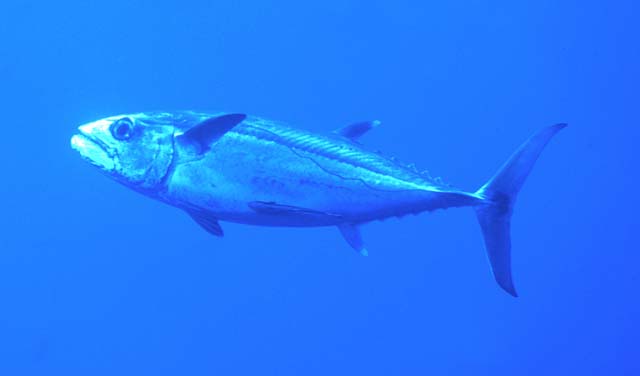| Scombridae (Mackerels, tunas, bonitos), subfamily: Scombrinae |
| 247.98 cm FL (male/unsexed); max.weight: 131 kg |
|
reef-associated; depth range 10 - 250 m, oceanodromous |
| Indo-Pacific: Red Sea and East Africa to French Polynesia, north to Japan, south to Australia. |
|
Dorsal spines (total): 13-15; Dorsal soft rays (total): 12-14; Anal spines: 0-0; Anal soft rays: 12-13; Vertebrae: 38-38. Mouth fairly large, upper jaw reaching to middle of eye. Laminae of olfactory rosette 48 to 56. Interpelvic process large and single. Lateral line strongly undulating. Body naked posterior to corselet. Swim bladder large, spleen visible in ventral view on the right side of the body. The back and upper sides brilliant blue-black, lower sides and belly silvery; no lines, spots or other markings on the body. |
| An offshore species found mainly around coral reefs. Generally solitary or occur in small schools of six or less. Preys on small schooling fishes such as Decapterus, Caesio, Nasio, Cirrhilabrus, Pterocaesio and squids. Marketed canned and frozen (Ref. 9684, 48637). Adults may be ciguatoxic (Ref. 37816). |
|
(Ref. 96402)
|
| reports of ciguatera poisoning |
|
Regularly caught in small numbers during certain seasons. Reported from Tubbataha Reefs (Ref. 53416). |
Source and more info: www.fishbase.org. For personal, classroom, and other internal use only. Not for publication.
Page created by Jen, 05.08.02,
php script by kbanasihan 06/09/2010 ,
last modified by
dsantos, 20/08/10

